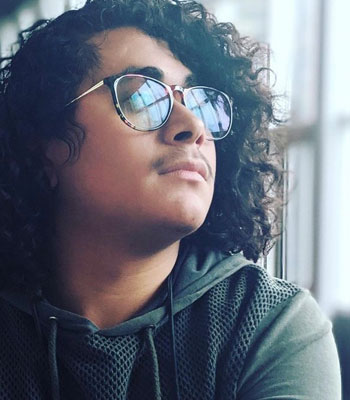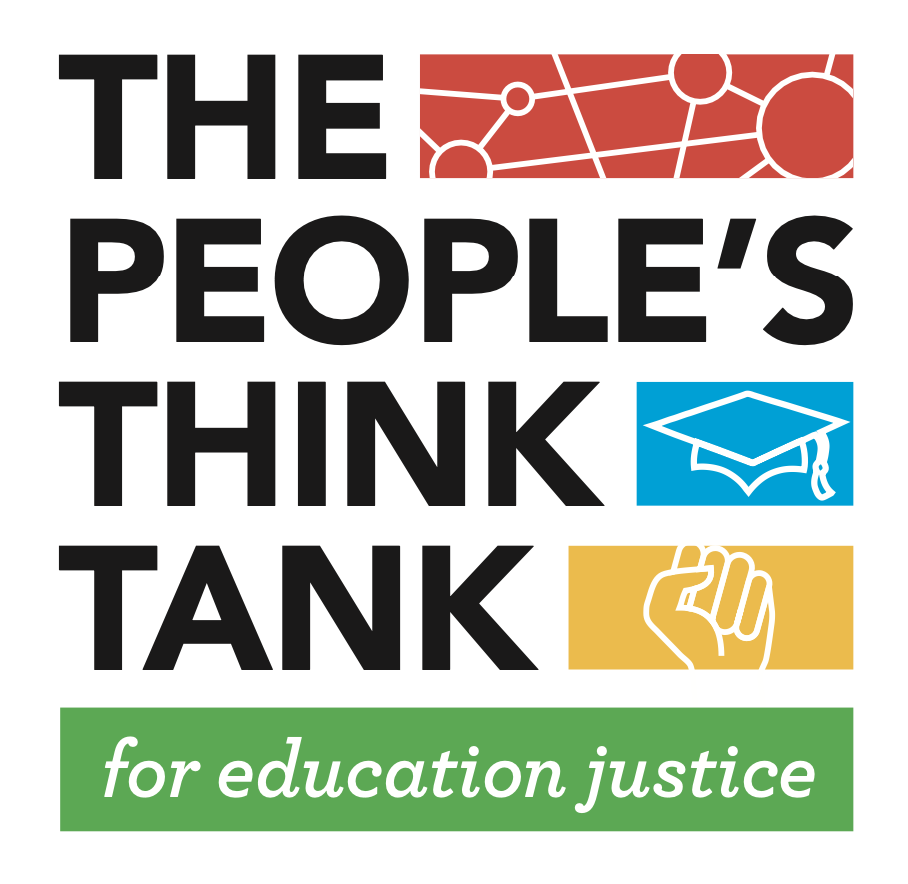< back to The Newest Abolitionists

By Bryan Aju
Urban Youth Collaborative and Sistas and Brothas United
With the assistance of Jessica De Jesus Acevedo
University of Massachusetts Boston
The Police-Free Schools movement is a movement in which students demand the elimination of police and school safety officers in public schools across the United States. Students like Bryan Aju are advocating for policy and systemic changes from all levels of administration and leadership levels. In Bryan’s story, we learn about a student’s community involvement that has increased commitment to social justice, developed leadership skills, and improved her life and the life of her community.
My name is Bryan A. Aju and I am 19 years old. I am a Gender non-conforming Latinx Queer activist in the Police-Free Schools movement. I come from a diverse racial background. I am Black and Puerto Rican, but I am also Japanese. I’m also proud to be a board member representing my organization Sistas and Brothas United.
I am a youth core leader for a youth-led coalition called the Urban Youth Collaborative (UYC) and my member group, Sistas and Brothas United (SBU) located in the Bronx, New York City. I have been a part of the organization since I was a first-year student in high school. Now in my first year of college, I focus my studies on culinary arts and aspire to be a chef upon completion of my program. My experiences and identity have led me to advocate for my community and family in so many ways.
Youth Leader
My involvement in the Urban Youth Collaborative has expanded my political analysis and has led me to become a better public speaker and activist for students like me. I am happy to come from a neighborhood of those who have been oppressed but are fighting for a larger good. In my leadership role, I work to empower students to advocate and improve high schools in the Bronx. I have been sharing my story to change the narrative of authorities in schools about what our students need. They need support not policing.
I have experienced and witnessed excessive force and lack of student empathy from officials at all levels. As a first-year student, I was very antisocial because I was nervous about being an LGBTQ student in high school. I had an extremely traumatizing experience with the school safety officers in my first year. I was dealing with depression and figuring out who I was as a person, so I decided to skip a class. I went into the girl’s locker room during that class period and was quickly victimized by the officers. The school safety officers abruptly raided the girl’s locker room and deemed me a danger to the community due to skipping a class.
The school safety officers put handcuffs on me and marched me out like a prisoner from the girl’s locker room. Patrol cops were not called but I was immediately suspended and told I could not return to school until a parent meeting was completed. Since we had just moved to New York City, my mom was unable to leave her new job to attend the suspension meeting for me to go back to school. I was suspended for three weeks due to this school disciplinary policy and missed important classwork. The school provided me little support during my suspension or upon my return to school.
Student Activist
Before I moved from Connecticut, during my first year of high school I often did not go to school, which led me to get held back twice. My school had no social-emotional support for students like me and I was expelled twice – not due to academic reasons but because I was a very emotional and depressed student. My transition into my Bronx high school was challenging, it was a new place and I was the new kid. My new school also was not equipped with a social worker or enough counselors who could relate to me but was met with police and metal detectors at the door, something I did not have in my Connecticut school.
I got involved with Sistas & Brothas United through a friend I had at the time. She invited me to a college trip, and I jumped at the opportunity to meet new people. I met the program directors of the SBU who talked to me about the mission of the group and its academic program. At that time, I admit that I was naive at how my words may have harmed others. I was also disconnected from the impact that policies and practices in my school and my community had on me as an individual and on the people closest to me. The Urban Youth Collaborative and SBU opened my eyes to how I needed to change and how I needed to become a leader and a voice for those around me.
Soon after joining SBU I quickly joined the Urban Youth Collaborative; I attended the meetings as a spectator. As I became more regularly involved with the organization, I became more involved with advocacy and participated in leadership training sessions. The director’s expectations for me were very high and I had to show them that I was committed. For several years while a youth leader in the program, I was asked to speak in meetings and in front of important school stakeholders.
I have had the opportunity to speak in front of the New York City Schools Chancellor and Mayor. Our organization was able to set up a meeting with Chancellor Richard Carranza to address our organization’s mission. I asked the chancellor and other members of the Department of Education what the strategies were that they were putting in place to support students’ social-emotional and mental health. I feel like it is my role even more now to support other marginalized and LGBTQ students and develop them as leaders and public speakers. I have been actively working as a youth leader and wish to empower the next group of leaders.
One of the biggest reasons I am still advocating for this movement is because I enjoy being a part of social justice work. I feel like I constantly get to learn and grow from other people’s experiences. Community storytelling can be either extremely negative or positive for those who listen. As an emotional person, I am always guaranteed to cry after hearing the deep stories of others. I must participate and elevate the voices of youth leaders I work with for them to feel more supported and heard.
The Urban Youth Collaborative has developed my skills not only as a public speaker but a leader. Being a member of the organization, I have felt powerful – not in the sense of strength but empowered by the other powerful people around me. It is surreal. I have been mentioned in articles that you can find if you search my name on Google. I will continue to fight for police-free schools because I understand the high need for more guidance counselors, mental health workers, and paraprofessionals in NYC public schools. I now understand that schools are supposed to be a safe space for students to deal with their problems, and the state must provide such opportunities.
Leading a Student Walkout
In 2018, I proudly led a student walkout from my high school. I was part of a student-led movement in New York City to protest gun violence. Over 100,000 students participated in this walkout to peacefully bring awareness to the problems with our gun laws. We wanted school changes that redirect resources to student support rather than more metal detectors and weapons for school security officers. My school and other schools in my neighborhood participated and we got a phone call with Mayor Bill de Blasio.
Our vice principal permitted us to gather in the back of the building, but we wanted our movement to be seen. She threatened to write me and everyone else up for leaving the building and school premises. We met up with other students from different schools and began to march towards the Department of Education Building – Bronx Borough Office to continue our protest.
The police and security officers’ presence in NYC public schools is the problem. For example, a student who is caught stealing should first have a conversation that gets to the root of why the person committed that action. School officials might learn that the student was living in poverty and in need which then could lead to a deeper conversation. Students should not be disciplined and suspended for minor errors in behavior. Rather we should take more time to talk and communicate with students to support them and their mental health.
Instead, my old school even had a jail-like cell stationed in it. School safety officers are supposed to de-escalate conflicts. But in one fight I saw, the school safety officers came and one of the kids got tasered and the other one was slammed on the ground.
Urban Youth Collaborative
Our organization demands the elimination of the use of zero-tolerance policies. Specifically, those that are suspending students for “Defying Authority,” which includes not taking off your hat. In New York, we want to stop disciplinary policies in schools that involve the police, school arrests, and the promotion of the school-to-prison pipeline. We are advocating for students who are being pushed into jails. Therefore, we need mental health professionals and support now more than ever due to the pandemic.
Schools can support students who are experiencing extreme difficulties through restorative justice and create a safe place for them to deal with their problems. We also want to study culturally related history and gender studies, not the one-sided history we get from the white male view.
Being a part of the work has been a positive influence in my life and led to more community involvement. I have even been able to recruit my younger brother into the organization. I feel like police-free schools will start to create a safe space for students. Parents and stakeholders may not agree with police-free schools, but they are not the students. There needs to be a better understanding that students are individuals who are all going to learn, think, and feel differently than adults.
I joined the Urban Youth Collaborative and Sistas & Brothas United because my ideals aligned with the organization’s mission. The organization has helped me and other young leaders become activists in our community. They also committed us to the work with our regular meetings, events, mentorship, and academic support. I am proud to be a part of SBU and the Urban Youth Collaborative in New York City.
Through the rest of this year, I will continue the work I have started and that I enjoy as a youth core leader. I will continue to support diverse students as much as I possibly can. I will continue protesting for the elimination of suspension for all grade levels, as well as to increase funding for paraprofessionals, nurses, counselors, and mental health experts in more schools across the country. I will proudly continue to advocate and share my story to support my community.
Regarding my academics, I plan to continue attending school for culinary arts. I have many different dreams for my future. I dream of one day opening a restaurant of my own that would also serve as a soup kitchen for the community. I want to provide people with a product and the community with an important service. I want to create a supportive space that is a restaurant for consumers but is also a location where the homeless can eat and get food or needed supplies. As a Black and Latinx, GNC person from the Bronx I will continue to fight for student needs.
In my community, we stand up for each other. If anything went south for me, I have people who would back me up. And me to them.
